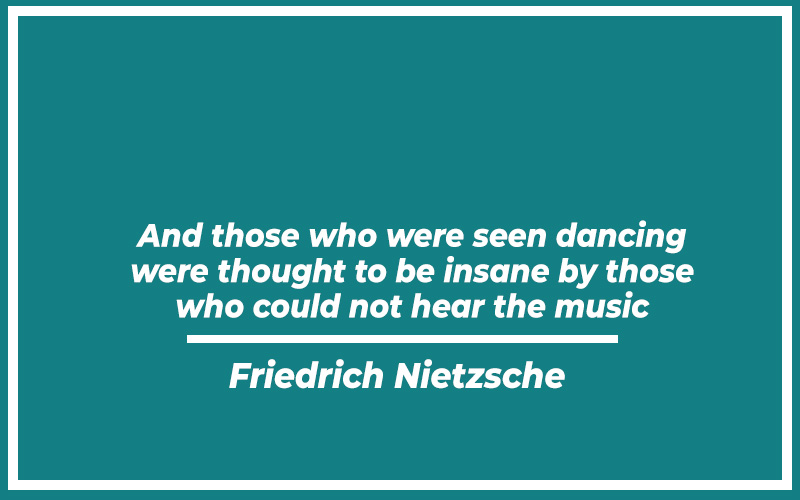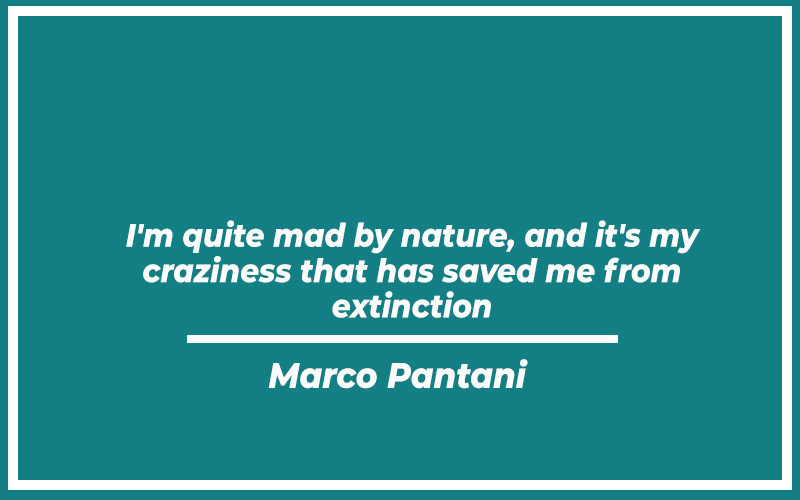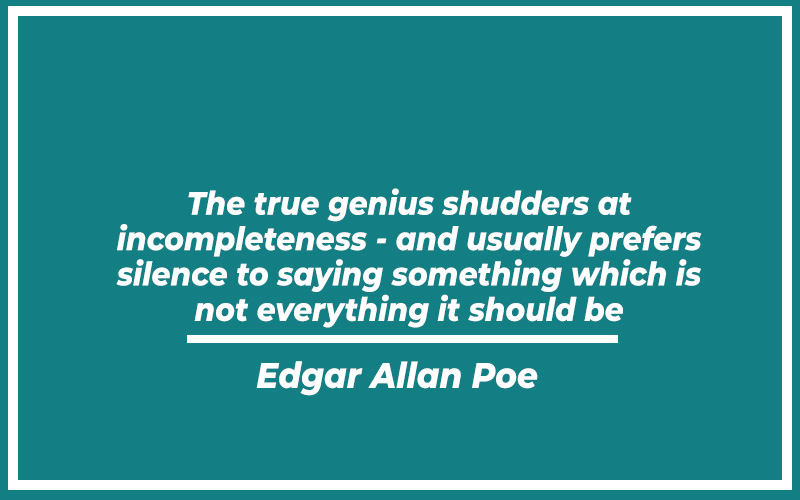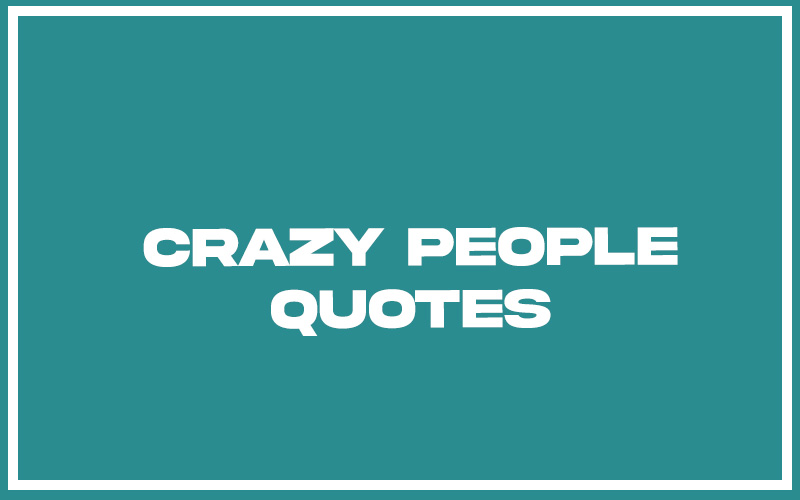We all know someone a little…out there. Maybe it’s your funny uncle with his offbeat ideas, or your neighbor who talks to the squirrels.
These “crazy people” quotes explore the concept of “crazy,” prompting us to question our own definitions of normal.
Let’s get started!
Crazy People Quotes

“And those who were seen dancing were thought to be insane by those who could not hear the music.” – Friedrich Nietzsche
This quote by Nietzsche encapsulates how perceptions of sanity are often subjective and context-dependent. What appears as madness to one might be profound wisdom to another. This highlights the importance of understanding and empathy, urging us to look beyond the surface and appreciate different perspectives.
It’s a reminder that true innovation and joy often come from those willing to break away from the norm and embrace their unique visions, even if they are misunderstood by society.
Also Read: Co-Parenting Quotes (with Explanation)
“I may be crazy, but it keeps me from going insane.” – Waylon Jennings
Waylon Jennings’ words reflect a paradox where embracing one’s eccentricities becomes a defense mechanism against the mundanity of life. This suggests that a bit of ‘craziness’ can be a healthy outlet, providing balance and preventing true insanity.
It’s about finding harmony in chaos and using one’s quirks as a form of resilience. This mindset encourages us to accept and celebrate our oddities, understanding that they might be what keep us grounded.
“Some people never go crazy. What truly horrible lives they must live.” – Charles Bukowski
Charles Bukowski’s quote challenges conventional notions of sanity, suggesting that a touch of madness is essential for a fulfilling life. He implies that those who never experience or embrace their wild side miss out on the richness of life.
This perspective valorizes the unconventional and the eccentric, positing that true vitality and creativity often arise from stepping outside the bounds of ‘normalcy.’
“In a mad world, only the mad are sane.” – Akira Kurosawa
Akira Kurosawa’s quote suggests that in a world filled with irrationality and chaos, those who are considered mad might actually be the only ones who truly understand reality.
This flips the usual perception of sanity on its head, proposing that so-called madness can be a rational response to an insane world. It invites us to question societal norms and recognize the wisdom in unconventional thinking.
“It is sometimes an appropriate response to reality to go insane.” – Philip K. Dick
Philip K. Dick’s statement acknowledges that the overwhelming nature of reality can push people towards insanity as a coping mechanism. This quote resonates with the idea that sometimes, the complexities and absurdities of life can be so extreme that a touch of madness is the only logical reaction.
It underscores the thin line between sanity and insanity and the fluid nature of mental health in response to external pressures.
“Not everyone is capable of madness; and of those lucky enough to be capable, not many have the courage for it.” – August Strindberg
August Strindberg’s quote reflects on the idea that madness is not just a state but also an act of bravery. It suggests that embracing one’s inner madness requires courage, as it involves stepping away from societal expectations and norms.
This perspective celebrates those who dare to live authentically and fully, despite the potential judgment or misunderstanding from others.
“Live life fully while you’re here. Experience everything. Take care of yourself and your friends. Have fun, be crazy, be weird. Go out and screw up! You’re going to anyway, so you might as well enjoy the process. Take the opportunity to learn from your mistakes: find the cause of your problem and eliminate it. Don’t try to be perfect; just be an excellent example of being human.” – Tony Robbins
Tony Robbins’ motivational words encourage embracing life’s imperfections and uncertainties. His advice to “be crazy, be weird” champions individuality and the pursuit of genuine experiences over societal expectations of perfection.
Robbins emphasizes the importance of learning from mistakes and enjoying the journey, promoting a philosophy of self-acceptance and continuous growth.
“Crazy people are considered mad by the rest of the society only because their intelligence isn’t understood.” – Weihui Zhou
Weihui Zhou’s quote highlights the thin line between genius and madness, suggesting that society often labels what it doesn’t understand as insanity. This perspective encourages us to rethink how we view unconventional thinkers.
It implies that what we perceive as madness may actually be a higher form of intelligence or creativity that defies traditional norms. This quote invites us to appreciate and embrace the unique perspectives that so-called “crazy” individuals bring to the world.
“Insanity in individuals is something rare – but in groups, parties, nations and epochs, it is the rule.” – Friedrich Nietzsche
Nietzsche’s observation underscores the idea that while individual madness is uncommon, collective insanity is prevalent throughout history. This quote suggests that large-scale irrationality often shapes societal norms and political movements.
It challenges us to reflect on the dynamics of group behavior and the dangers of conformist thinking. By recognizing this pattern, we can become more vigilant against the collective madness that can lead to destructive outcomes.
“There is a pleasure in being mad, which none but madmen know.” – John Dryden
John Dryden’s quote delves into the paradoxical joy that can come from madness. This statement suggests that there is a unique freedom and satisfaction in embracing one’s madness, something only those who experience it can truly understand.
It highlights the intrinsic value of nonconformity and the liberation found in breaking free from societal constraints. Dryden’s words encourage us to find joy in our quirks and to recognize the hidden pleasures in what others may deem irrational.
“No excellent soul is exempt from a mixture of madness.” – Aristotle
Aristotle’s insight suggests that a touch of madness is an essential component of greatness. This quote implies that extraordinary individuals often possess a blend of rationality and madness, which fuels their creativity and passion.
It challenges the stigma around mental health, advocating for a more nuanced understanding of what it means to be exceptional. Aristotle encourages us to see madness as a potential source of strength and inspiration, rather than a flaw.
“Normal is not something to aspire to, it’s something to get away from.” – Jodie Foster
Jodie Foster’s quote emphasizes the value of individuality over conformity. It suggests that striving to be “normal” limits personal growth and creativity. This perspective celebrates uniqueness and encourages us to embrace our differences.
Foster’s words are a call to action to break free from societal expectations and to find fulfillment in our authentic selves. It’s a reminder that true success and happiness come from embracing our individuality rather than conforming to external standards.
“Some people never go crazy, What truly horrible lives they must live.” – Charles Bukowski
Charles Bukowski’s quote challenges the idea that sanity is always desirable. It suggests that a bit of madness is essential for a rich and fulfilling life. This perspective implies that those who never experience or embrace their wild side miss out on the deeper, more passionate aspects of life.
Bukowski’s words encourage us to value the unpredictable and the unconventional, recognizing that true vitality often comes from embracing the chaos within us.
“When the whole world is running towards a cliff, he who is running in the opposite direction appears to have lost his mind.” – C. S. Lewis
C. S. Lewis’ quote speaks to the courage of nonconformity. It suggests that those who think and act differently from the majority are often seen as mad. This perspective encourages us to value independent thinking and to question societal trends that may lead to detrimental outcomes.
Lewis’ words inspire us to have the strength to stand alone in our convictions, even when it means being misunderstood or labeled as insane.

“I’m quite mad by nature, and it’s my craziness that has saved me from extinction.” – Marco Pantani
Marco Pantani’s words highlight the paradoxical power of madness. He suggests that his inherent madness has been a source of resilience and survival. This perspective underscores the idea that embracing one’s craziness can be a protective mechanism against life’s challenges.
Pantani’s quote encourages us to see our eccentricities as strengths rather than weaknesses. By accepting and harnessing our unique traits, we can find the inner strength to thrive despite external pressures.
“Creativity and madness often go hand in hand.” – John Lydon
John Lydon’s quote emphasizes the close relationship between creativity and madness. It suggests that the same qualities that fuel artistic innovation can also lead to unconventional or erratic behavior.
This perspective validates the struggles many creative individuals face, portraying their madness as an integral part of their genius. Lydon’s words encourage us to appreciate the full spectrum of creativity, recognizing that brilliance often comes with its own set of challenges.
“There’s a fine line between genius and insanity. I have erased this line.” – Oscar Levant
Oscar Levant’s quote plays with the idea that genius and insanity are closely linked. By claiming to have erased the line between them, Levant suggests that embracing one’s madness is essential to achieving true brilliance.
This perspective challenges societal norms that separate the two, advocating for a more holistic understanding of human potential. Levant’s words inspire us to embrace our quirks and eccentricities as vital components of our creative and intellectual endeavors.
“The world is a canvas, and crazy people are the artists.” – Unknown
This quote illustrates the idea that those deemed ‘crazy’ often possess a unique vision that transforms the world. It likens the world to a blank canvas, implying that it is the unconventional thinkers who bring it to life with their creativity.
This perspective celebrates the impact of nonconformists and encourages us to view madness as a source of beauty and innovation. It invites us to embrace our inner artist and see the world through a lens of endless possibilities.
“No one can drive us crazy unless we give them the keys.” – Douglas Horton
Douglas Horton’s quote highlights the importance of personal agency in maintaining mental well-being. It suggests that we have control over how much we let others affect our state of mind. This perspective empowers us to set boundaries and take responsibility for our mental health.
Horton’s words serve as a reminder that we can choose not to let external pressures drive us to madness, emphasizing the power of self-control and resilience.
“Show me a sane man and I will cure him for you.” – Carl Jung
Carl Jung’s humorous yet profound statement suggests that complete sanity is an illusion. By implying that everyone has their own form of madness, Jung invites us to embrace our imperfections.
This quote challenges the notion of absolute mental health, advocating for a more accepting and inclusive view of human nature. Jung’s words encourage us to find value in our quirks and to understand that a touch of madness is a natural part of being human.
“We are all born crazy. Some remain that way.” – Samuel Beckett
Samuel Beckett’s quote suggests that madness is an inherent part of the human condition. It implies that while some people grow out of their madness, others retain it throughout their lives. This perspective normalizes the presence of madness, portraying it as a natural state rather than an aberration.
Beckett’s words encourage us to accept and celebrate our innate craziness, recognizing it as an integral aspect of our individuality and humanity.
“Madness is rare in individuals – but in groups, parties, nations, and epochs, it is the rule.” – Friedrich Nietzsche
Nietzsche’s observation highlights how collective behavior often descends into madness more easily than individual actions. This perspective underscores the influence of social dynamics and groupthink in fostering irrationality.
It warns us about the dangers of losing individual critical thinking in favor of collective hysteria. Nietzsche’s words encourage us to remain vigilant against the pressures of conformity and to value independent thought, especially in times of social and political upheaval.
“There is always some madness in love. But there is also always some reason in madness.” – Friedrich Nietzsche
This quote by Nietzsche eloquently captures the intertwined nature of love and madness. It suggests that love, with its irrational passions, often resembles madness, yet within this madness lies a form of reason. This perspective appreciates the complexity of emotions and the way they drive human behavior.
Nietzsche’s words invite us to embrace the irrational aspects of love, recognizing that they are an essential part of its profound beauty and meaning.
“The edge… there is no honest way to explain it because the only people who really know where it is are the ones who have gone over.” – Hunter S. Thompson
Hunter S. Thompson’s quote reflects the elusive nature of the boundary between sanity and madness. It implies that only those who have experienced true madness can understand its depths. This perspective suggests that the limits of human experience and understanding are often pushed by those who venture into the extremes.
Thompson’s words challenge us to acknowledge the complexity of the human psyche and the insights that can be gained from exploring its edges.
“A man who is ‘of sound mind’ is one who keeps the inner madman under lock and key.” – Paul Valéry
Paul Valéry’s quote suggests that sanity involves controlling one’s inner madness. This perspective highlights the duality within each person, where rationality coexists with irrational impulses. It implies that maintaining sanity requires a balance between these opposing forces.
Valéry’s words encourage us to recognize and manage our inner chaos, understanding that it is a natural part of the human condition and essential for achieving a harmonious existence.
“Insanity is doing the same thing over and over again and expecting different results.” – Albert Einstein
Einstein’s quote defines insanity as repetitive behavior without learning from past outcomes. This perspective emphasizes the importance of adaptability and critical thinking in achieving success. It suggests that true madness lies in refusing to change one’s approach despite repeated failures.
Einstein’s words serve as a powerful reminder to innovate and evolve, urging us to break free from unproductive habits and embrace new strategies for problem-solving and growth.

“The true genius shudders at incompleteness – and usually prefers silence to saying something which is not everything it should be.” – Edgar Allan Poe
Edgar Allan Poe’s quote speaks to the perfectionist tendencies often found in genius, where the fear of incompleteness leads to silence.
This perspective highlights the intense inner struggle for perfection that can border on madness. It suggests that the pursuit of excellence can be both a driving force and a source of torment.
Also Read: Tropic Thunder Quotes (with Explanations)
Final Thoughts
Sometimes the most interesting people are the ones who break the mold. They are usually funny, fascinating, or a little frightening and they simply speak their minds a little too freely.
Hopefully, this will challenge your assumptions and make you think twice about who you label “crazy.”

